

The Value of Formative Assessment. The current wave of test-based "accountability" makes it seem as though all assessment could be reduced to "tough tests" attached to high stakes.
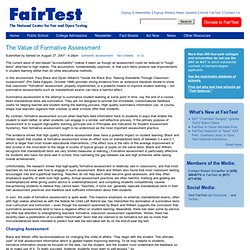
The assumption, fundamentally unproven, is that such tests produce real improvements in student learning better than do other educational methods. In this environment, Paul Black and Dylan Wiliam's "Inside the Black Box: Raising Standards Through Classroom Assessment" (Phi Delta Kappan, October 1998) provides strong evidence from an extensive literature review to show that classroom "formative" assessment, properly implemented, is a powerful means to improve student learning -- but summative assessments such as standardized exams can have a harmful effect.
Summative assessment is the attempt to summarize student learning at some point in time, say the end of a course. Most standardized tests are summative. They are not designed to provide the immediate, contextualized feedback useful for helping teacher and student during the learning process. The Fundamentals of Formative Assessment.
Formative Assessment Definition. Formative assessment refers to a wide variety of methods that teachers use to conduct in-process evaluations of student comprehension, learning needs, and academic progress during a lesson, unit, or course.
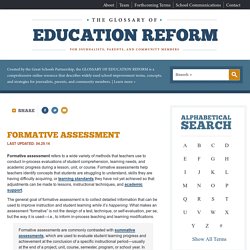
Formative assessments help teachers identify concepts that students are struggling to understand, skills they are having difficulty acquiring, or learning standards they have not yet achieved so that adjustments can be made to lessons, instructional techniques, and academic support. The general goal of formative assessment is to collect detailed information that can be used to improve instruction and student learning while it’s happening.
What makes an assessment “formative” is not the design of a test, technique, or self-evaluation, per se, but the way it is used—i.e., to inform in-process teaching and learning modifications. Formative Assessment Classroom Techniques (FACTs) Examples of Formative Assessment. When incorporated into classroom practice, the formative assessment process provides information needed to adjust teaching and learning while they are still happening.
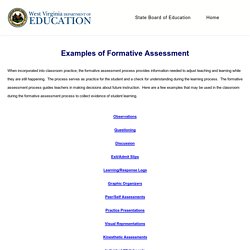
The process serves as practice for the student and a check for understanding during the learning process. The formative assessment process guides teachers in making decisions about future instruction. Here are a few examples that may be used in the classroom during the formative assessment process to collect evidence of student learning. Observations Questioning Discussion Exit/Admit Slips Learning/Response Logs Graphic Organizers Peer/Self Assessments Practice Presentations Visual Representations Kinesthetic Assessments Individual Whiteboards Laundry Day Four Corners Constructive Quizzes Think Pair Share Appointment Clock. Edisdat.ied.edu.hk/pubarch/b15907314/full_paper/1926551038.pdf. Definition of Formative Assessment. Definition: A formative assessment can be defined as a variety of mini assessments that allow a teacher to adjust instruction on a frequent basis.
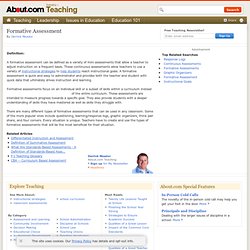
These continuous assessments allow teachers to use a variety of instructional strategies to help students reach instructional goals. Embedded Formative Assessment: Amazon.co.uk: Dylan Wiliam. Active Learning through Formative Assessment: Amazon.co.uk: Shirley Clarke. Formative vs Summative Assessment - Teaching Excellence & Educational Innovation - Carnegie Mellon University. Formative assessment The goal of formative assessment is to monitor student learning to provide ongoing feedback that can be used by instructors to improve their teaching and by students to improve their learning.
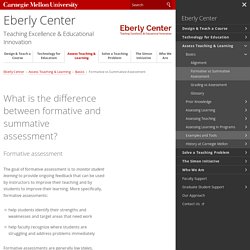
More specifically, formative assessments: help students identify their strengths and weaknesses and target areas that need workhelp faculty recognize where students are struggling and address problems immediately Formative assessments are generally low stakes, which means that they have low or no point value. Formative vs summative assessment at UKCLE. Here Rob East of the University of Glamorgan sets out the differences and indeed the similarities between formative and summative assessment.
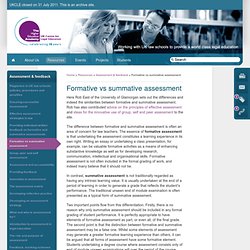
Rob has also contributed advice on the principles of effective assessment and ideas for the innovative use of group, self and peer assessment to the site. The difference between formative and summative assessment is often an area of concern for law teachers. The essence of formative assessment is that undertaking the assessment constitutes a learning experience in its own right.
Writing an essay or undertaking a class presentation, for example, can be valuable formative activities as a means of enhancing substantive knowledge as well as for developing research, communication, intellectual and organisational skills. What Are Formative Assessments and Why Should We Use Them? "Informative assessment isn't an end in itself, but the beginning of better instruction.
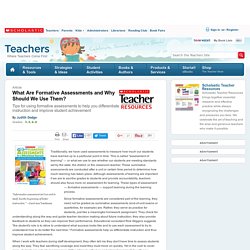
" —Carol Ann Tomlinson Traditionally, we have used assessments to measure how much our students have learned up to a particular point in time. This is called "assessment of learning" — or what we use to see whether our students are meeting standards set by the state, the district, or the classroom teacher. These summative assessments are conducted after a unit or certain time period to determine how much learning has taken place. Although assessments of learning are important if we are to ascribe grades to students and provide accountability, teachers should also focus more on assessment for learning. Since formative assessments are considered part of the learning, they need not be graded as summative assessments (end-of-unit exams or quarterlies, for example) are.
When I work with teachers during staff development, they often tell me they don't have time to assess students along the way. Exit Cards. Formative Assessment. Summative assessment is: used for judgement assessment of learning Formative assessment is: used for improvement assessment for learning There are many definitions of formative assessment in the literature; for convenience and brevity, we will use this one: The key point is the importance of feedback in forming the students' learning.
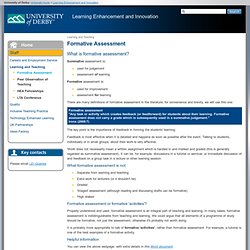
Feedback is most effective when it is detailed and happens as soon as possible after the event. 'Work' does not necessarily mean a written assignment which is handed in and marked and graded (this is generally regarded as summative assessment). Types of assessment - definitions - Support for students and staff - University of Exeter. Formative assessment Formative assessment is an integral part of teaching and learning.
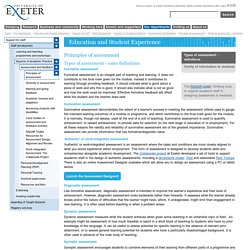
It does not contribute to the final mark given for the module; instead it contributes to learning through providing feedback. It should indicate what is good about a piece of work and why this is good; it should also indicate what is not so good and how the work could be improved. Effective formative feedback will affect what the student and the teacher does next. Formative vs Summative Assessment - Teaching Excellence & Educational Innovation - Carnegie Mellon University. Formative Assessment - Centre for Learning and Teaching Resources. Formative assessment is about assessment for learning as opposed to summative where assessment is of learning.
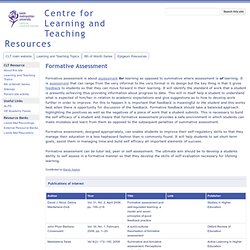
It is assessment that can range from the very informal to the very formal in its design but the key thing is that it gives feedback to students so that they can move forward in their learning. It will identify the standard of work that a student is presently achieving thus providing information about progress to date. This will in itself help a student to understand what is expected of him/her in relation to academic expectations and give suggestions as to how to develop work further in order to improve.
For this to happen it is important that feedback is meaningful to the student and this works best when there is opportunity for discussion of the feedback. Formative feedback should take a balanced approach highlighting the positives as well as the negatives of a piece of work that a student submits.